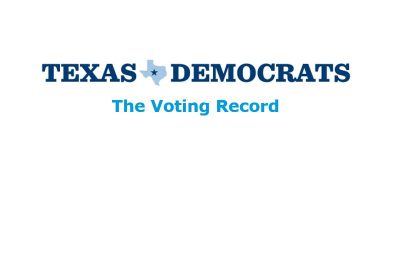The 88th regular legislative session finally came to a close Monday, May 29. Sadly but unsurprisingly, Texas Republicans filed many bills that intended to take over our local elections. Since Republicans control both chambers of the legislature, they were able to pass some of these bills — but we thank our Democratic legislators who worked tirelessly to defend our elections and the right to vote, many of them were thwarted. From the many committee hearings that went long, to the floor debates they engaged in, and the amendments they offered, we want to highlight their work and convey our thanks.
We want to specifically call out a few bills that died and will not become law thanks to the great work of Texas Democratic legislators this session!
- SB 990 (Hall) would have banned countywide voting. Thankfully, voters in the 90 counties that allow voters to vote anywhere in the county on Election Day will retain those options in 2023 and beyond.
- HB 636 (Patterson, Cain) would have expanded who can carry a handgun in a polling place. Thankfully, nothing has changed, and we have not seen any major incidents around firearms at polling places and hope that continues.
- HB 2390 (Isaac) would have prohibited college campuses from serving as designated polling place locations. Thankfully, this bill died and we can continue our efforts to expand voting opportunities on college campuses.
A recap of the election-related bills that passed both chambers of the Legislature and were sent to the Governor’s desk (and we expect them to become law) is below.
Bills That Negatively Impact Elections in Texas
- SB 1933 (Bettencourt) – Would allow the Secretary of State (SoS) to give orders to and overrule decisions of local election officials in Harris County. Originally, the bill affected all local election officials but was amended to only target Harris County. Harris County is suing to block this measure from going into effect.
- SB 1750 (Bettencourt) – Eliminates the Election Administrator role in Harris County, overruling the democratically elected Harris County Commissioners’ decision to centralize and professionalize elections in their county. Harris County is suing to block this measure from going into effect.
- HB 1243 (Hefner) – Would increase the penalty for illegal voting from a Class A misdemeanor to a second-degree felony.
- SB 1070 (Hughes) – Texas would quit its membership in ERIC, the only interstate data exchange that helps states keep the voter rolls accurate and helps new Texans and those who move get registered at their new address. It will push Texas to create or opt into a new, unproven Republican-created system that only seeks to remove voters from the rolls.
Bills That Help Texas Voters
- SB 477 (Zaffirini) – Would expand disability access for Texas voters, including improving procedures for curbside voting.
- HB 357 (Bucy) – After Republicans pared this bill down, it should make the online mail ballot tracker slightly easier to use. To use the tracker, a voter will no longer be required to enter their registration address. The final version of the bill also took the language from HB 371 (Bucy) to standardize the runoff election date for non-partisan races. Having a standard election date statewide will enable statewide communication to voters for these non-partisan runoffs that occur twice a year.
- HB 3159 (Leach) – Would authorize a person eligible to vote by mail on the grounds of disability or confinement for childbirth to receive and cast a ballot using an accessible electronic absentee mail system approved by the Secretary of State. The voter could make their selections electronically and then would print out a ballot and have to mail it in, so their vote would still be done on paper and received by the county elections office by mail (not electronically).
- SB 1599 (Hughes) – Would make some administrative improvements to the mail voting process. Sen. Hughes (R), Chair of Senate State Affairs, originally sought to reduce the number of days voters have to fix problems with their mail ballot from the current six days after the election to two days, but he accepted Sen. Borris Miles’ (D) amendment on the Senate floor to maintain the current mail ballot “cure period.”
To everyone who called their legislators, sent emails or letters, or testified at a committee, thank you for your time and advocacy.
Special Session
Upon adjournment of the 88th Legislative Session, Governor Abbott immediately called for a special session, the first of “several,” and directed the legislature to focus on property taxes and border security.
The Texas House quickly passed legislation answering the Governor’s call and sent those bills to the Senate. One week later, Lt. Gov. Dan Patrick had not yet brought these bills to a vote. The House adjourned. The Senate is left with the option of passing the House’s version of these bills or — if they pass their own versions – probably going into another special session on these same issues since the House has adjourned and said they will not negotiate over the differences.
Abbott has threatened not to sign any more bills that were passed by the 88th legislature if a tax bill isn’t passed in this special session. Abbott can sign or veto bills by Sunday, June 18, — or do nothing and let them become law anyway.
Brenda Cruz, Deputy Voter Protection Director, Texas Democratic Party

